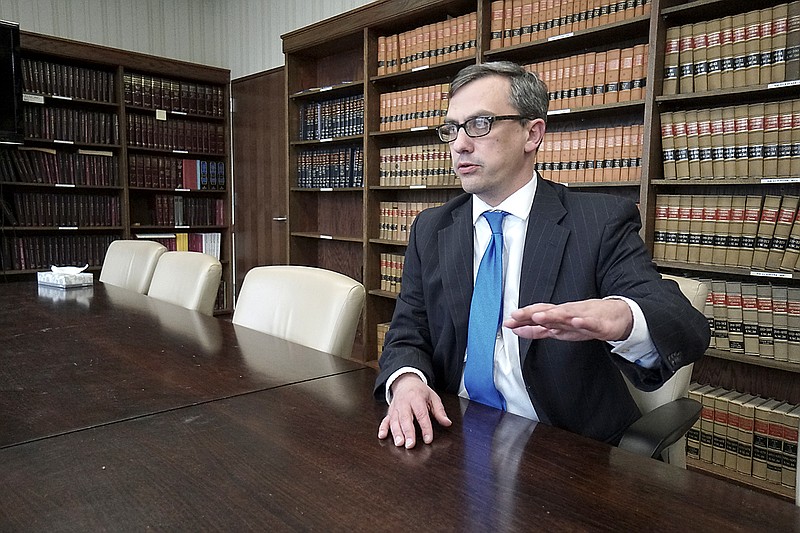It's not specific enough.
That's what defense attorneys are saying about the evidence Hamilton County District Attorney General Neal Pinkston has provided so far on his proposal that would ban 31 accused gang members from associating with each other in East Lake Courts.
"I need [that] information before we can have a hearing," said Chrissy Mincy, a defense attorney who is representing a few of the men. "Instead, they're trying to pass through an injunction without giving the information. And that just doesn't seem right."
When he announced the plan, Pinkston said the "gang injunction" would give police officers another legal tool to stop routine troublemakers in the gangs known as the Grape Street Crips and the Gangster Disciples.
His office has received one request for discovery (case evidence), which is an ongoing process, his spokeswoman Melydia Clewell said Monday afternoon. Before a case reaches its conclusion, lawyers often exchange evidence since both sides are entitled to "discover" details about the other's case.
Mincy said she and a small team of defense attorneys have been studying the proposed injunction, a civil tool that other law enforcement agencies have used nationwide, since Pinkston unveiled his plan in late September. But they've been crunched for time.
A week after Pinkston filed the proposed injunction, Criminal Court Judge Barry Steelman heard five hours of testimony so that witnesses wouldn't have to return to court. That included neighbors, video clips of unrelated shootings, and testimony about how trained officers determine who's a gang member. The core message: These 31 men were helping turn a nearly 2-mile area of East Lake Courts into a hub of criminal activity.
Judge Steelman, a former criminal prosecutor in the Hamilton County District Attorney's Office, hasn't approved the gang injunction yet.
He could order it into effect during a scheduled hearing on Nov. 30, officially declaring the Grape Street Crips and the Gangster Disciples a "public nuisance." If that happens, the 31 men wouldn't be allowed to serve as a lookout for police, own graffiti equipment, be near or drink alcohol, or associate with each other, among other activities. If caught, they would face up to 30 days in jail and a $50 fine.
Mincy and other defense lawyers have voiced concerns about the injunction, saying it would trample people's constitutional right to association, make new crimes out of already illegal activities, and inject further tension between minority communities and law enforcement.
As a sign of changing times, Mincy pointed Monday to the Massachusetts Supreme Judicial Court, which recently overturned the conviction of a man who was charged with carrying a firearm after running from a Boston police officer.
The court, which released its ruling about one week before Pinkston filed his proposal, said a black man shouldn't immediately be considered suspicious for running from police. Instead, citing police data and a 2014 American Civil Liberties Union of Massachusetts report, the court said he might be attempting to avoid "the recurring indignity of being racially profiled."
But, Mincy said, her most pressing objective is to slow down the discovery process, giving the defense more time to develop a strategy.
Since the injunction is a civil matter, lawyers have more tools to explore in the case. They could depose investigating officers under oath before any sort of trial or outcome. They also can file requests for written information to be answered under oath within 30 days - which is what Mincy did.
Pinkston agreed to send information to defense attorneys on the case by Oct. 24, records show. But the responses from his office, which they received on that date, weren't detailed enough, Mincy said.
Three days later, she filed a more in-depth request. Among other things, Mincy asked for proof that gang members hang out in East Lake Courts; lists of any individuals and businesses that support the proposed injunction; and a clearer start date for the state's investigation into the accused gang members (in an early exchange, Pinkston simply wrote "2016," records show).
Mincy also focused on a crime report that Pinkston attached to the back of his petition. It includes several diagrams that track the number of aggravated assaults, burglaries, homicides, thefts and vandalisms from Jan. 1, 2014 to Sept. 1, 2016, in East Lake.
"Please identify the person or persons responsible for compiling the data and state the source of the data," Mincy wrote.
In response, spokeswoman Clewell said the proposed injunction would not violate constitutional rights, but would "restore the rights of those in East Lake who are terrorized by gang members and gang activity."
Furthermore, she said, it would not apply to anyone who is unaffiliated with a street gang and wouldn't authorize any kind of illegal searches.
"The District Attorney did not go including people willy nilly to the petition for injunction," Clewell wrote in an email. "The Chattanooga Police Department and the District Attorney's Office spent several months researching the gangs and gang members that are driving violence in the East Lake area."
Other area defense attorneys said they planned to file requests on behalf of their clients, but those documents were not immediately available Monday afternoon.
Contact staff writer Zack Peterson at zpeterson@timesfreepress.com or 423-757-6347. Follow on Twitter @zackpeterson 918.
